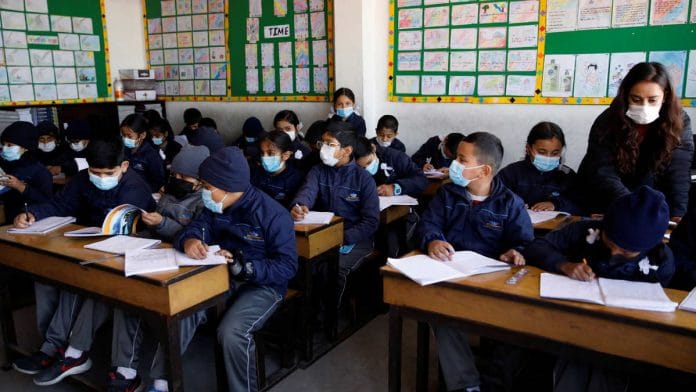New Delhi: An estimated 14 per cent of India’s young people aged 15-24 years reported feeling depressed and uninterested, against an international median of 19 per cent, according to UNICEF’s new ‘State of the World’s Children (SOWC)’ report, released Tuesday.
This is the first-ever SOWC report to focus on mental health.
The incidence of mental health problems in children, the report points out, has been aggravated by Covid restrictions.
“Fear. Loneliness. Grief. As the coronavirus pandemic descended on the world in 2019, these powerful emotions enveloped the lives of many millions of children, young people and families,” the report notes. “In the early days especially, many experts feared they would persist, damaging the mental health of a generation. In truth, it will be years before we can really assess the impact of Covid-19 on our mental health.”
The survey, carried out for UNICEF by Gallup in 21 countries in the first half of 2021, found that Indian youth are less willing to share their feelings of lowness.
“A median of 83 per cent of young people (15 to 24 years old) agreed it was better to deal with mental health problems by sharing experiences with others and seeking support; by contrast, only 15 per cent felt such problems were personal and should be dealt with on one’s own,” it says. “Among the 21 countries, India was the only exception, with 41 per cent of young people supporting the sharing option.”
This is a worrying finding because this means that such youngsters are less likely to seek and get professional help and will, therefore, continue to suffer with undiagnosed mental health conditions.
The report estimates that more than 13 per cent of the world’s adolescents, aged 10-19, live with a diagnosed mental disorder. This represents 8.6 crore adolescents aged 15-19 and 8 crore adolescents aged 10-14.
The unwillingness to talk about how they feel, the report argues, could come from the social stigmatisation of mental health conditions.
The report documents instances of such stigma across the world.
On India, it writes: “Children do not learn to stigmatise mental health conditions on their own; many mirror behaviours they see in the world around them. For example, a cross-sectional study of 566 secondary school teachers in South India found that nearly 70 per cent believed that depression was weakness, not sickness, and that it was unpredictable but not dangerous.”
Solutions
Parents and caregivers have a very important role to play in addressing children’s mental health needs, but programmes supporting them are very important, says the report, and cites examples of such initiatives from around the world.
From India, it picked a school-based initiative from Bihar.
“Strengthening evidence base on school-based interventions for promoting adolescent health (SEHER) in Bihar, India, is an example of a whole school multicomponent mental health promotion programme that is operated on a large scale and has been tested,” it says about the NGO-led initiative.
“Features activities for all students and also individualised counselling for students in need. It operates in conjunction with a live skills training programme integrated into classrooms,” the report adds.
Also Read: Can Covid vaccine improve your mental health? Yes, says US study
High cost of unaddressed mental health needs
The report estimates that 45,800 adolescents die by suicide each year, making it the fifth most prevalent cause of deaths in the 10-19 age group.
Among older adolescents (15-19 years), it is the fourth most common cause of death after road injury, tuberculosis and interpersonal violence, it adds.
“New analysis for this report indicates that the annual loss in human capital arising from mental health conditions in children aged 0-19 is $387.2 billion (purchasing power parity dollars). Of this, $340.2 billion reflects disorders that include anxiety and depression, and $47 billion reflects the loss due to suicide. Of the $340.2 billion, anxiety disorders account for 26.93 per cent; behavioural disorders 22.63 per cent; and depression 21.87 per cent,” the report says.
Unaddressed mental health needs are also a function of availability of mental health experts, it adds.
The report says the number of psychiatrists who specialise in treating children and adolescents is fewer than 0.1 per 100,000 in all but high-income countries, where the figure is 5.5 per 100,000.
(Edited by Sunanda Ranjan)
Also Read: What’s the impact of Covid on mental health? Your hair holds the answer, new study says






